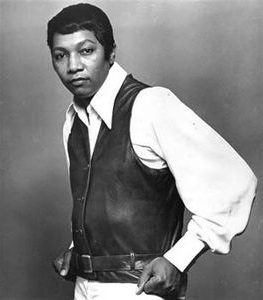 Thanksgiving has come and gone. I hope it was a good one for you. Can it be that we’re already into December? As the singer/songwriter Eric Anderson once said, time runs like a freight train. Before we know it, we’ll be into 2016, and hopefully a fresh start after a not so great year for this country, and the world in general.
Thanksgiving has come and gone. I hope it was a good one for you. Can it be that we’re already into December? As the singer/songwriter Eric Anderson once said, time runs like a freight train. Before we know it, we’ll be into 2016, and hopefully a fresh start after a not so great year for this country, and the world in general.
Luther Ingram was one of those guys who was just not going to take no for an answer. He didn’t care what the world thought. He knew what was in his heart though, and he was going to follow his heart despite the fact that it seemed to be leading him to a dark place. As the old saying goes, the heart knows what it wants.
Ingram was born in Jackson, Tennessee in 1937, but spent most of his childhood in Alton, Illinois. Early on he sang in a group that included some of his siblings, but when he was a teenager he started writing his own songs, and set out on a solo career. The highlight of Ingram’s early career was opening shows for Ike Turner in East St. Louis. Eventually Ingram moved to New York City where, legend tells us, he roomed with a young guitar player named Jimi Hendrix.
Ingram got a record deal in 1965, signing with Decca Records. His first single for the label was “You Never Miss Your Water,” but neither that single or the follow-up, “(I Spy) For the FBI” (Smash Records), found any chart success. Ingram next tried a small label called Hurdy Gurdy, but “Run For Your Life” flopped, as did his single for HIB Records, the instrumental “Exus Trek.”
The next stop on Ingram’s journey took him to Memphis. Producer Johnny Baylor had started a label called KoKo there, and Ingram got on board. Unfortunately, his track record didn’t get any better. Neither “I Can’t Stop” in 1967, or the following year’s “Missing You” garnered much attention.
Things started to improve for Ingram when Baylor made a distribution deal with Stax Records. In 1969 Ingram finally scored a chart hit with “My Honey and Me,” which reached #19 on the R&B chart, and #55 on the pop chart. The next year, Ingram scored again with “Ain’t That Loving You (For More Reasons Than One),” which was not only a Top Ten R&B hit, but came close to hitting the pop Top 40.
Ingram was not only recording hits of his own, he was writing hits for others. He collaborated with Mack Rice on the Staple Singers smash “Respect Yourself” in 1971. But it was the single that Ingram released the following year that would be the one that he will always be remembered for. “(If Loving You Is Wrong) I Don’t Want to Be Right” was written by Stax staff writers Homer Banks, Carl Hampton, and Raymond Jackson, and released on KoKo in 1972. The dark yet deeply romantic tale of an adulterous affair raced to the top of the R&B chart, where it remained for four weeks. It also rose to #3 on the Billboard Hot 100. Cover versions of the song include takes by the Faces, Millie Jackson, Barbara Mandrell, and Rod Stewart as a solo artist.
Ingram didn’t stop there. He followed-up his massive success with R&B hits like “You Were Made For Me,” “Always,” and “Love Ain’t Gonna Run Me Away.” In 1973 he hit the pop Top 40 one last time with “I’ll Be Your Shelter (In Time of Storm).” Ingram should have been on top of the world at that point, but KoKo was mired in financial problems, and although Ingram released several more singles in the ’70s, the company’s distribution problems doomed them to obscurity.
It took him until 1986, but Ingram finally found his was back to the R&B Top 40 with his Profile Records release “Baby Don’t Get Too Far.” “Don’t Turn Around” and “Gotta Serve Somebody” also found a little bit of success in the late ’80s. In 1992 Ingram came to the end of his recording career with the release of “I Like the Feeling” on Ichiban Records.
Luther Ingram suffered from diabetes, kidney disease, and partial blindness for a number of years. He died of heart failure on March 19, 2007.






Comments